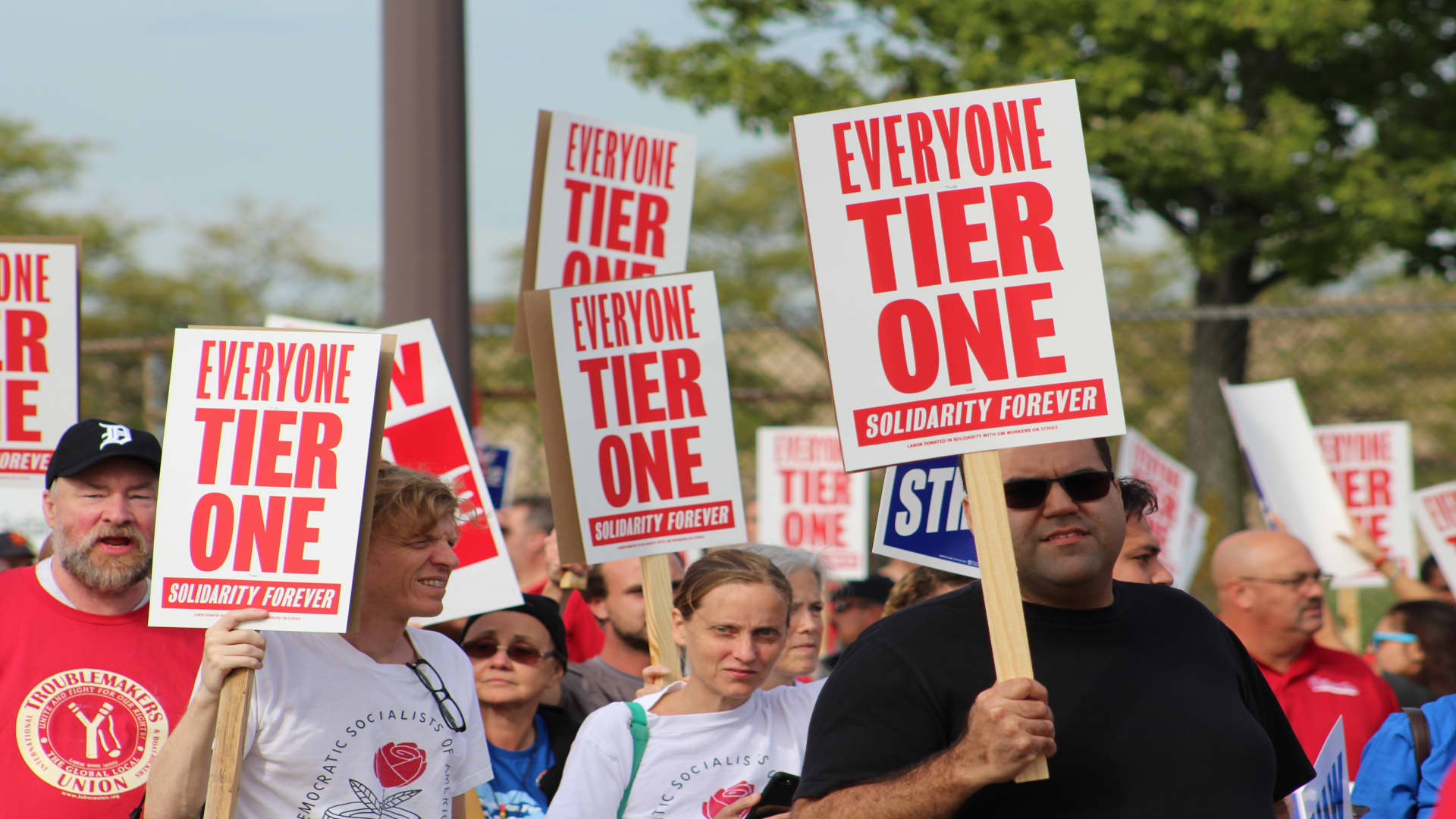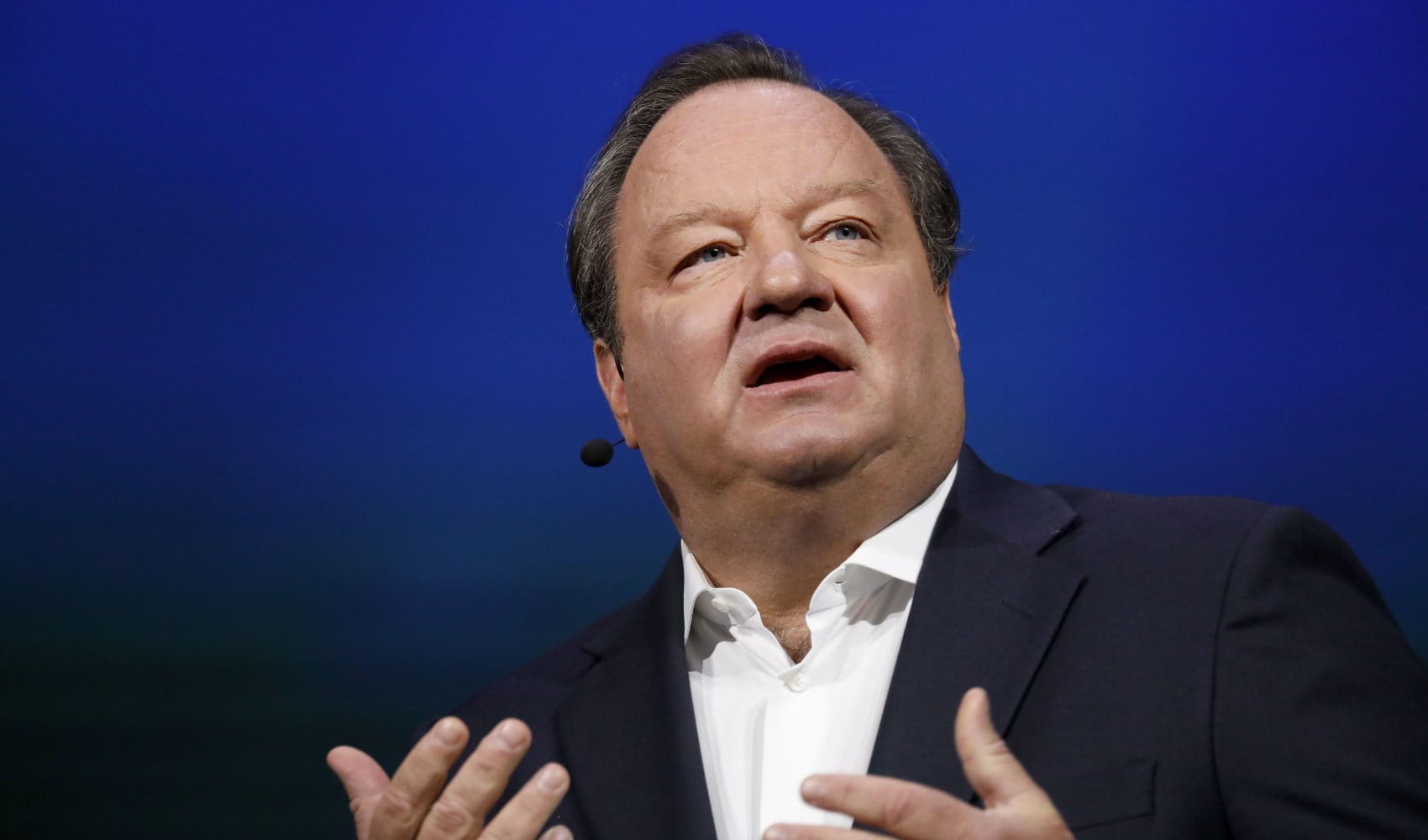
- Contracts between the United Auto Workers union and General Motors, Ford Motor and Stellantis expire at 11:59 p.m. on Sept 14.
- Harsh rhetoric from UAW President Shawn Fain, plus the revelation of NLRB complaints against GM and Stellantis, make an auto workers' strike increasingly likely.
- Once a tentative agreement is reached between the union and the automakers, workers have to ratify the contracts, posing another hurdle.
DETROIT – United Auto Workers President Shawn Fain appears ready to fire up the picket lines.
The union's bulldog new leader has repeatedly vowed to drive a hard bargain with Detroit automakers General Motors, Ford Motor and Stellantis in contract negotiations ahead of an expiration at 11:59 p.m. on Sept 14.
He's maintained it's a hard deadline that his leadership team does not plan to extend, like the union has in the past, and that he's not afraid to take roughly 150,000 auto workers out of factories if necessary.
Get Southern California news, weather forecasts and entertainment stories to your inbox. Sign up for NBC LA newsletters.
That — plus the revelation late Thursday that Fain and the union filed unfair labor practice charges against GM and Stellantis with the National Labor Relations Board, claiming the companies weren't bargaining in good faith — makes a strike against one, if not all three of the automakers, increasingly inevitable.
Unlike prior union leaders, Fain is attempting to negotiate with all three automakers at once, refusing to select a "target" company to focus on while extending deals at the others. He's also been far more confrontational with the automakers compared to previous union leaders, at times launching personal attacks on executives.
There's a belief among some industry analysts and experts that a strike, or several, may be necessary to convince UAW members that the union leaders fought as hard as they could to reach the demands.
Money Report
"I expect there to be a strike," said Art Wheaton, a labor professor at the Worker Institute at Cornell University. "I think there's a reasonable chance they strike Stellantis first and then give a couple more days for Ford and GM to give a better offer."
Wheaton believes that a strike at Stellantis is nearly guaranteed with the sides as far apart as they are now. The union could use that work stoppage as a warning to GM and Ford to finalize their deals, he said.
"I think a strike is almost essential at Stellantis or they will never get a deal ratified," Wheaton said. "Stellantis is picking a fight, saying, 'Try me if you dare.'"
Strikes could take various forms, including a national strike, where all workers under the contract cease working, or targeted work stoppages at certain plants over local contract issues.

Prolonged strikes against all three of the automakers would be unprecedented and quickly impact the automotive supply chain, U.S. economy and domestic production.
The Biden administration has taken particular interest in the talks, including the appointment of longtime Democratic adviser Gene Sperling to monitor the situation for the White House.
Wall Street watching
Wall Street has warned of a potential work stoppage for several months, and investors have taken heed.
A brief survey of 99 investors by Morgan Stanley found 58% believe a strike is "extremely likely." That's followed by 24% who said it's "somewhat likely." Just 16% said a strike was unlikely, while 2% said it was "neither likely not unlikely."
Industry and labor experts agree, and for good reason.
The impending contract deadline follows combative rhetoric by Fain and other union leaders; a years-long labor movement involving work stoppages, including the UAW; and ambitious demands by the union for 40% or more pay increases, retention of platinum healthcare and a 32-hour workweek.
Such demands aren't typically made public or even fully reported until close to the end of the negotiations, in part as an effort to bargain in good faith but also to avoid setting expectations — either too high or too low — for UAW members, who need to ratify the contracts after the sides announce a tentative agreement.
"I've always said that the best way to reach agreements is to be negotiating with each other and not in the newspapers, TV or anywhere else," said Dennis Devaney, senior counsel at Clark Hill who formerly served as a NLRB board member and attorney for GM and Ford. "I don't think the public negotiation … is really going to move things along."

To be clear, it's not exclusively up to Fain to call for strikes. It's up to the UAW's 14-member International Executive Board (IEB), which Fain leads as president. The leaders, based on weighted votes, must approve such a work stoppage by a two-thirds majority vote.
Then there's the question of how long a strike would last.
Of its surveyed investors, Morgan Stanley found the vast majority of respondents (96%) expected a potential strike to last longer than a week. Over a third (34%) expect the strike to last longer than a month.
A strike against GM in 2019 during the last round of contract negotiations lasted 40 days and cost the automaker $3.6 billion in earnings that year, GM reported at the time.
The UAW has more than $825 million in its strike fund, which it uses to pay eligible members who are on strike. The strike pay is $500 per week for each member.
Assuming 150,000 or so UAW members covered by the contracts, strike pay would cost the union about $75 million per week. A fund of $825 million, then, would cover about 11 weeks. One caveat: that doesn't include health-care costs that the union would cover, such as temporary COBRA plans, that would likely drain the fund far more quickly.
Ratification
For much of the union's history, it was largely expected that members would ultimately approve whatever deal was bargained and endorsed by UAW leaders.
However, in recent negotiations, that hasn't been the case and the sides have needed to return to the negotiating table.
That was the situation two rounds of negotiations ago, in 2015, with then-Fiat Chrysler, now Stellantis, workers, who voted down a tentative agreement. That same year, GM skilled trade workers also voted against a tentative deal with the Detroit automaker, stalling ratification.
Typically, once a tentative deal is reached between the union and an automaker, the members of that automaker will then vote by local organization on whether to accept the tentative agreement and make it a contract. The whole ratification process can take about two weeks for each company.
"The UAW's tentative agreement with an automaker is really a set of agreements—the main text, as well as appendixes for different aspects, such as pensions and retirement plans, health care benefits, supplemental unemployment benefits, profit sharing, personal savings plans, life and disability benefits, dependent care benefits, and salaried workers (for those who are also UAW-represented)," said Kristin Dziczek, automotive policy advisor for the Federal Reserve Bank of Chicago's Detroit branch, in a blog post.
In 2019, it took eight additional weeks to negotiate and ratify all three agreements once the first tentative agreement was reached following GM's strike. The negotiations and ratification voting ended in early December.
Spokespeople for the automakers declined to comment directly for this article, but reiterated that their teams continue to bargain in good faith with the union in hopes of deals that benefit both sides.
– CNBC's Michael Bloom contributed to this report.






